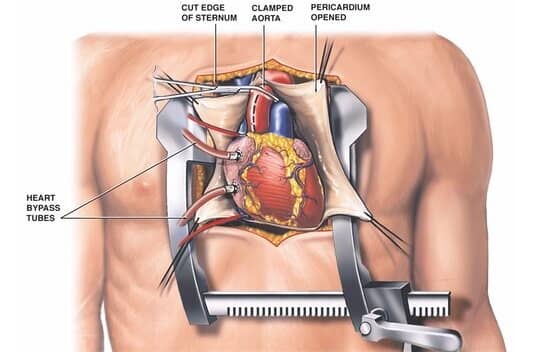Heart bypass surgery, also known as coronary bypass grafting (CABG), is performed by a surgeon to improve the flow of blood to the heart and reduce the risk of a heart attack. In India, coronary bypass surgery is extremely prevalent, and it is performed on a large number of people. A surgeon grafts blood vessels from other parts of the body into the heart, allowing them to bypass the clogged or damaged veins in the organ. The goal is to restore more blood & supply blood to the heart when a blockage has blocked the flow of blood and oxygen.
In many ways, heart surgery is analogous to highway or signal controllers, who unclog traffic so that a route can be traveled freely. Although the procedure does not treat the underlying cause of the heart illness, it helps alleviate the symptoms, and in certain cases, it can help heart health & reduce the chance of death from heart failure. Following surgery, you might well be instructed to rest and adhere to a healthy regimen to recover faster. The majority of people can maintain a healthy lifestyle for decades or longer.

The cost of Heart Bypass Surgery in India varies depending on the type of surgery performed. The only thing that remains constant is the success rate, which is guaranteed if one chooses one of the top hospitals for open-heart surgery. The cost of open-heart surgery in India is Rs.2,88,000 (expected).
In open-heart surgery, the following procedures are carried out:
A patient under the age of 70 who is in fair to great physical shape is a possibility for Low-Cost Heart Surgery in India.
A patient who weighs below 30 pounds and who can adapt to the lifestyle factors necessary to survive for a lengthy period is considered to be healthy.
Yes, depending on the health, the frequency of clogged arteries in the heart, and the amount of damage, your healthcare experts may recommend a specific form of bypass surgery.
Types of heart bypass surgery are mentioned below:
Single bypass: Performed only 1 artery in the heart is clogged
Double bypass: When 2 of the arteries get damaged.
Triple bypass: Performed when 3 arteries are damaged.
Quadruple bypass. 4 arteries are damaged.
The presence of two or more blocked arteries increases the likelihood that the procedure may take longer than expected or that medical intervention will be required by the doctors.
Choose the best hospital of open heart surgery cost in India at affordable price and get the best treatment.
Q1. What is the most common complication of open-heart surgery?
One of the major complications of open-heart surgery is the bleeding from the area where the incision or the surgery was done. For this, you will be kept under monitoring and will be routinely assessed by the doctor and the medical team during the initial recovery period.
Q2. What are the restrictions after open heart surgery?
You should not lift, push, pull or carry any heavy items after your open-heart surgery. You should look to avoid any tough physical strenuous activity and workouts like jogging, running, biking, tennis, swimming, and heavy gym workout for at least three months after your open-heart surgery.
Q3. How should I sleep after my open-heart surgery?
Once you have completed your open-heart surgery, it is recommended that you sleep in an upright position for the first few weeks of your recovery period to help the chest bone heal. You can use a recliner or a foldable bed for sleeping and use a neck pillow to support your spinal and neck region.
Q4. How long will it take to recover from the open-heart surgery?
It usually takes around six to twelve weeks depending on the level and the extent of the surgery for a patient to fully recover. It is advised that you consult with your doctor and consultant regularly to get a correct assessment of your recovery and find the timeline to return to normal activity.
Q5. How long will I suffer from chest pain after the open-heart surgery?
You will likely see mild pain and discomfort for the first few weeks after your open-heart surgery. It might even induce sharp pains for time being. This will die down and you will feel no such pain after the first four to six weeks.